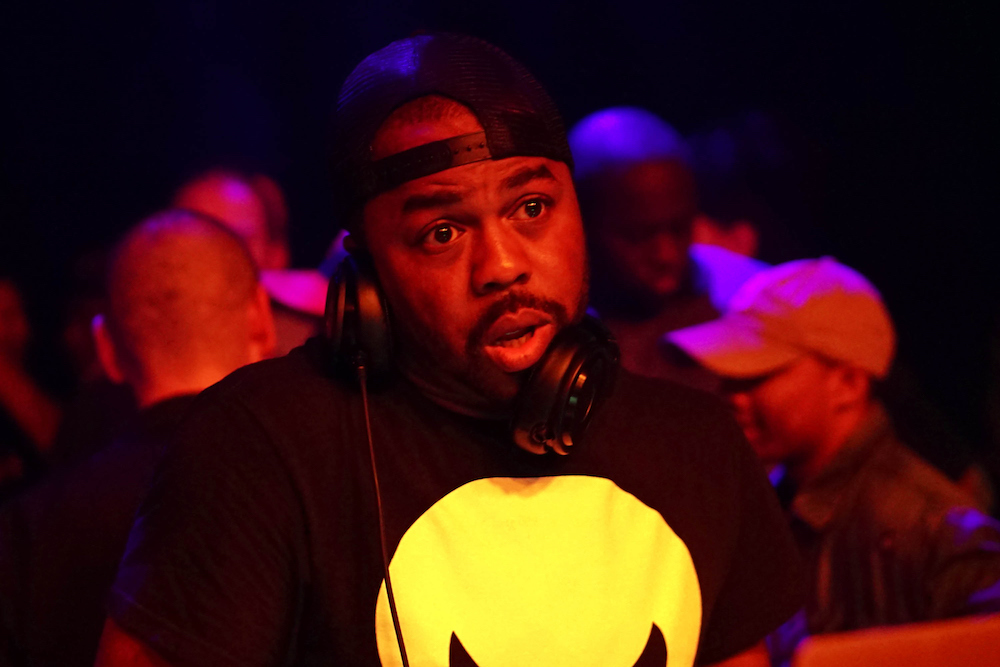Beyoncé’s Lemonade instantly resonated after its HBO premiere, but the credit list behind the album was a bit of a rigmarole. The Yeah Yeah Yeahs got a writing credit via an Ezra Koenig tweet from 2011. Father John Misty got put on by an Emile Haynie connection. Jack White and Soulja Boy are credited on the same album somehow.
Just Blaze was one of the few clarions of that large cabal. One of Lemonade’s most definitive moments is when “Freedom” rolls in with its church-like organs and crisp drums to elevate the catharsis. Viewers almost immediately thought it was a Just Blaze beat before the official credits confirmed their suspicions. Hell, some connected it to Just Blaze when it was a snippet that played during The “Formation” World Tour trailer back in February. That’s how much of a signature his production’s blend of b-boy sharpness and near-religious verve has become. If they allow hustlers beyond the pearly gates, they’re selling mixtape CDs with Just Blaze beats on them.
For Beyoncé, the Kendrick Lamar-featuring “Freedom” is another highlight in a career full of them. Just Blaze, meanwhile, has earned the approval of the hazardous Beyhive thanks to a career of producing some of Roc-A-Fella and the Diplomats’ most cherished records, in addition to many, many others. But the question around “Freedom” is the same question that comes with everything surrounding Beyoncé’s output: How did this come together? We asked the producer about crafting the probable hit, how hard it is to keep such a high-profile collaboration a secret, and what makes a Just Blaze beat a Just Blaze beat.
One thing I noticed on Twitter is how folks heard “Freedom” and thought, “Hey, that’s a Just Blaze beat.” How does instant recognition feel?
Beyoncé had a demo of the record that she had already been working on, and as she was working on it, she was like, “Just Blaze has to do this.” It’s like the prototypical Just Blaze sound: the whole ’60, ’70s [sampling], super-hard drums, feels like it should be played in the stadiums, sample chops — things of that nature. As she was working on it, I get a call, “Beyoncé has this record…” I came and checked it out, she gave me all the parts, and we kinda knocked it out pretty quickly.
With all that said, it’s still very cool that people can pick up something like that and immediately be like, “Yo, that’s Just Blaze.” Even when they played the unfinished demo snippet after the Super Bowl — the teaser for the tour — my Twitter blew up. People were like, “Do you have a song with Beyoncé?” I didn’t watch the Super Bowl so I didn’t realize they aired that, so I was like, “How do people know about this?” Then I realized she used a snippet of it in the commercial. It is pretty cool people picked up on that sound off a 20-second snippet.
How did you start developing that signature sound to your production?
It wasn’t at a singular point of my career. It was just kind of something that I guess — you have records like “PSA” and records like “U Don’t Know” with Jay and “I Really Mean It” with the Diplomats and “What We Do” with Freeway, and it just became one of my signature sounds. I never said, “Hey, this was going to be my sound.” It’s just became something that I became known for doing.
I heard “Freedom” and it did take me back to The Blueprint’s “U Don’t Know.”
Exactly. This is like her “PSA.” It’s her “U Don’t Know.” It was the perfect time for it.
Was it hard keeping a Beyoncé collaboration a secret? Because even with the teaser, people were blowing up your Twitter.
A lot of people, when they work with Beyoncé or artists of that stature in general, there’s usually a number of [Non-Disclosure Agreements] involved and you go through a process. With me, there wasn’t much of any of that because I’ve known her for years and I’ve worked with Jay for almost 14, 15 years. Obviously, it’s never going to be an issue of security with me. I mean, I have at least two albums’ worth of Jay Z material sitting in my vault. So it’s not that they ever have to worry about me leaking records or releasing information. I give people sneak peeks when it’s appropriate or when the artists want to do it.
In general, I don’t share too much, because you can get excited about something, share some information that your artist might not want you to share just yet, or you end up sharing something that ends up not happening. How many times have you seen pictures of artists in the studios working or collaborating with other artists or producers, and two years later, there’s still no song?
Is there more pressure formulating a beat for “Freedom”? Roc-A-Fella is one thing, but the Beyhive will be on your back.
The Beyhive, they are serious. But you can never ask for a more loyal fanbase — ever. I think the only thing I’ve seen really comparable to that is probably Eminem and, to a certain degree, Nicki Minaj. The crazy thing is, from that little Super Bowl snippet, somebody got word that I produced it, who the writers were, and what the sample was. All from the 20-second snippet. And [fans] were tweeting me crazy, asking me on social media for information. I just laugh at it: They know they’re not gonna get any information out of me. But they do what fans do.
Do you change up your mindset at all when creating for Beyoncé as opposed to a rapper?
Not really. The best way I think you should produce for Beyoncé is kind of the way I produce in general. I always produce from the standpoint of performance. And by that, I mean when I’m working on a record, I visualize the artist performing their record during the show. I’m thinking about what instruments they’re playing on stage, what point in the show does this song fall. Is this an opener, a closer, is this an encore? Is this a dark moment of the show? That’s kind of how I generally produce my music anyways, which is why I think my music has so much energy and tangibility to it. I produce it to be performed.
From when she gave you the unfinished demo, how long did it take you to finish the track?
We had knocked it out within three days. One thing I always say is that you can spend a lot of time trying to make a decent record good. Then you have records that are just organically already good. You just spend the rest of your time making it great… I just spent time tweaking what was a really good record into a really great record, and taking a great record and making it the best that I could.
I kinda already had the idea to put Kendrick on it. It’s funny because she had the same idea and we didn’t even talk about it. By the time I went to go express to them that they should get Kendrick on the record, [Beyonce’s team] had already reached out to him to be on the record.
It must’ve been a crazy couple of days because you have Lemonade and Prince passing away a couple of days before.
It’s been a really crazy time. I don’t think there’s really anything I can say about Prince’s passing that hasn’t already been said. But Prince’s passing is extremely bewildering. On one hand, you’re happy you have a project that’s been well received by critics, the public, and fans… But [on the other hand] it’s just a terrible loss of one of the most amazing and talented singers, songwriters, and performers we will ever see. People are acting like they lost a family member, and for a lot of us, Prince was like a family member.
I’d imagine you have plenty of records in the stash. Are you waiting on timing or the right artists to finally release them?
Timing. There are records that I held onto for years, and the time they came out was the perfect time for those records to come out. The sample that’s in “Freedom,” my homie actually controls the rights to that record. I haven’t had access to that sample for years. And then at the right situation he uses it. So it’s coincidental that me and Beyoncé would be at the same page with that sample. Some records that I’ve had for one artist ended up becoming huge hits for somebody else.
I was just telling somebody the other day that people who work at Interscope have been trying to get me to work with Eminem since his second album. It didn’t happen until Recovery, and Recovery was just the perfect time for me and him to get together. We were both in the same space where we were both on the same page… For me, I don’t really worry about that sort of thing. The right records will come at the right time for the right artist they’re supposed to.





